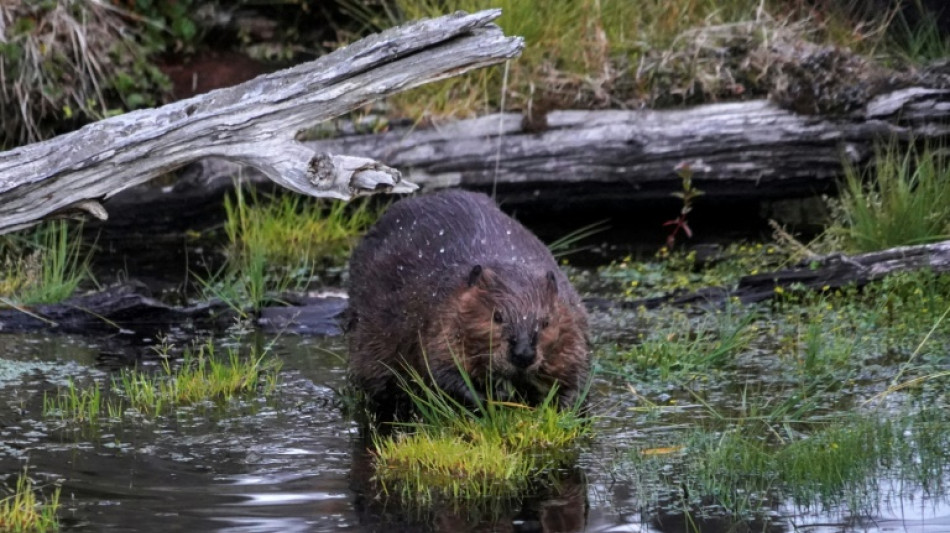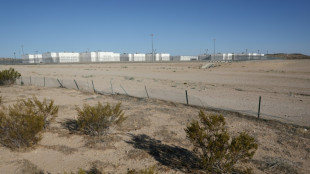
-
 Powerhouse Gyokeres can give Arsenal missing edge
Powerhouse Gyokeres can give Arsenal missing edge
-
Britain leads calls for airdrops as Gaza hunger crisis deepens

-
 Ecuador deports more than 800 Colombian inmates as Bogota cries foul
Ecuador deports more than 800 Colombian inmates as Bogota cries foul
-
Arsenal sign Swedish international Viktor Gyokeres

-
 Spain's pioneers 'knocking down walls' with run to Euro 2025 final
Spain's pioneers 'knocking down walls' with run to Euro 2025 final
-
Greece asks for EU help in battling wildfires

-
 Rahul and Gill frustrate England in fourth Test after Stokes century
Rahul and Gill frustrate England in fourth Test after Stokes century
-
Norris reassured by pole after Belgian Grand Prix 'worries'

-
 England ready to meet challenge of 'fantastic' Spain in Euro 2025 final
England ready to meet challenge of 'fantastic' Spain in Euro 2025 final
-
US migrant raids spark boom for private detention providers

-
 'Make America Gay Again': Amsterdam pride gets political
'Make America Gay Again': Amsterdam pride gets political
-
Over 600 malnourished children die in six months in Nigeria: MSF

-
 Hamilton holds hands up after 'unacceptable' qualifying
Hamilton holds hands up after 'unacceptable' qualifying
-
Norris on pole as McLaren lock-out front row at Belgian Grand Prix

-
 Johannesburg to host first LIV Golf event in Africa
Johannesburg to host first LIV Golf event in Africa
-
Pogacar on cusp of fourth Tour title as Groves solos to stage 20 win

-
 Motor rally accident kills three spectators in France
Motor rally accident kills three spectators in France
-
Lando Norris claims pole for Belgian Grand Prix

-
 'Famine', 'starvation': the challenges in defining Gaza's plight
'Famine', 'starvation': the challenges in defining Gaza's plight
-
Stokes ends two-year wait for Test hundred before Gill holds firm for India

-
 Australian Groves wins penultimate Tour stage, Pogacar in yellow
Australian Groves wins penultimate Tour stage, Pogacar in yellow
-
Root has no interest in Tendulkar run-record hype

-
 Too early to judge Gill and his young India team, says Dev
Too early to judge Gill and his young India team, says Dev
-
Liverpool beaten 4-2 by AC Milan in Hong Kong pre-season friendly

-
 NASA says it will lose about 20 percent of its workforce
NASA says it will lose about 20 percent of its workforce
-
Farrell says win over Australia 'what dreams are made of'

-
 Trump plays golf in Scotland as protesters rally
Trump plays golf in Scotland as protesters rally
-
Stokes ends two-year wait for Test hundred before India collapse in fourth Test

-
 Lions stage stunning comeback to beat Wallabies and win series
Lions stage stunning comeback to beat Wallabies and win series
-
Taiwanese voters reject attempt to recall opposition lawmakers

-
 Thai-Cambodia clashes spread along frontier as death toll rises
Thai-Cambodia clashes spread along frontier as death toll rises
-
Stokes ends two-year wait for Test hundred as England press for India series win

-
 Liverpool to remember Jota with permanent tribute
Liverpool to remember Jota with permanent tribute
-
'We are neighbours': fleeing Thais and Cambodians call for peace

-
 Verstappen begins new Red Bull era with Belgian sprint win
Verstappen begins new Red Bull era with Belgian sprint win
-
French left urges Macron to act over US plan to destroy contraceptives

-
 Howe confident Isak will stay at Newcastle despite transfer talk
Howe confident Isak will stay at Newcastle despite transfer talk
-
Top seed Fritz falls as Raducanu and Fernandez win at DC Open

-
 Belgian region grapples with forever chemical scandal
Belgian region grapples with forever chemical scandal
-
New-look Australia focused on LA 2028 at swimming worlds

-
 China urges global consensus on balancing AI development, security
China urges global consensus on balancing AI development, security
-
David's century sparks Aussies to T20I clincher over WIndies

-
 Death toll rises in Thai-Cambodian clashes despite ceasefire call
Death toll rises in Thai-Cambodian clashes despite ceasefire call
-
Taiwan votes in high-stakes recall election

-
 China prodigy takes on swimming world aged 12
China prodigy takes on swimming world aged 12
-
UN gathering eyes solution to deadlocked Palestinian question

-
 Polls open in Taiwan's high-stakes recall election
Polls open in Taiwan's high-stakes recall election
-
4 Steps to Budget When Living on Your Own in Lafayette, LA

-
 'Alien' lands at Comic-Con
'Alien' lands at Comic-Con
-
Top footballers afraid to speak out against playing too many games: FIFPro chief

| RBGPF | -1.52% | 73.88 | $ | |
| SCS | 0.66% | 10.58 | $ | |
| NGG | -0.11% | 72.15 | $ | |
| RELX | -1.86% | 52.73 | $ | |
| BP | 0.22% | 32.2 | $ | |
| RYCEF | -0.3% | 13.2 | $ | |
| GSK | -0.68% | 37.97 | $ | |
| CMSC | 0.24% | 22.485 | $ | |
| BCC | 1.94% | 88.14 | $ | |
| BTI | -0.71% | 52.25 | $ | |
| SCU | 0% | 12.72 | $ | |
| CMSD | 0.17% | 22.89 | $ | |
| BCE | -0.95% | 24.2 | $ | |
| VOD | -0.79% | 11.43 | $ | |
| AZN | -1.4% | 72.66 | $ | |
| JRI | -0.46% | 13.09 | $ | |
| RIO | -1.16% | 63.1 | $ |

Eager beaver: dams improve quality of river water hit by climate change
Hotter, drier weather means beaver populations are spreading in the western United States, and their dams are helping to mitigate the negative impacts of climate change on river water quality, according to a new study on Tuesday.
The findings -- discovered almost by accident -- offered a "rare bright spot" in an otherwise bleak landscape of climate change news, the lead author told AFP.
Stanford University scientists and colleagues conducted the research over three years on the East River, a main tributary of the Colorado River in the US state of Colorado.
It has long been known that beaver dams can improve the quality of river water by filtering out contaminants.
But what came as a surprise is what the Stanford team described as a virtuous climate change-induced "feedback" loop.
It works like this: hotter, drier spells linked to a warming world often reduce water quality, mainly because less water leads to a higher concentration of contaminants such as nitrate, a form of nitrogen.
At the same time, a changing climate has increased the range of industrious buck-toothed beavers, and widened the impact of their dams, thus helping to dilute the negative impact of global warming.
"In building more dams, they mitigate that degradation in water quality that's caused by climate change," lead author Christian Dewey told AFP.
When the beavers' dams raise water levels upstream, water is diverted into surrounding soils and secondary waterways, collectively called a riparian zone.
"These zones act like filters, straining out excess nutrients and contaminants before water re-enters the main channel downstream," according to a press release about the study, published in Nature Communications.
- 'Rare bright spot' -
The same contaminants -- potentially harmful to humans, animals or plants in river water -- are thus dispersed with little or no negative impact in soils.
This is good news in the area where the research was conducted, as the Colorado River provides drinking water and supports livelihoods for some 40 million people, according to the US government.
Nitrogen in particular promotes algae overgrowth, which starves water of oxygen needed to support diverse animal life and a healthy ecosystem.
The study found that the benefits provided by the beaver dams improved water quality in both high- and low-water conditions linked to climate change -- whether hot and dry spells, or heavy rainfall and snowmelt.
In both cases, "the beaver dam pushed more water and nitrate into surrounding soil than did either seasonal extreme, leading to vastly more removal of nitrate", Dewey said.
He said he did not set out to study beaver dams initially, but one cropped up on the river he was testing for seasonal changes in hydrology.
"It was incredibly lucky," he said.
He cautioned that the feedback dynamic may be unique to the particular conditions in western United States, and thus may not be found elsewhere.
But the findings are still "a rare bright spot in climate news", and perhaps an example of nature restoring balance.
"We push too far, and then (there's) sort of a swinging back in the other direction, at least in the case of beavers."
O.Karlsson--AMWN


